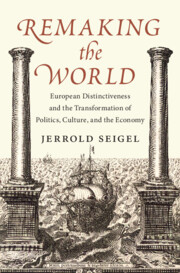 Remaking the World
Remaking the World Book contents
- Remaking the World
- Remaking the World
- Copyright page
- Contents
- Figures
- Acknowledgments
- 1 Introduction
- Part I Liberty and Liberties
- Part II Autonomy and Teleocracy
- Part III Openness and Domination
- Part IV Making Industry Modern
- 12 Autonomy and Transformation
- 13 Transformation and Autonomy
- 14 Ready or Not?
- 15 Conclusion
- Notes
- Index
12 - Autonomy and Transformation
Britain
from Part IV - Making Industry Modern
Published online by Cambridge University Press: 29 November 2024
- Remaking the World
- Remaking the World
- Copyright page
- Contents
- Figures
- Acknowledgments
- 1 Introduction
- Part I Liberty and Liberties
- Part II Autonomy and Teleocracy
- Part III Openness and Domination
- Part IV Making Industry Modern
- 12 Autonomy and Transformation
- 13 Transformation and Autonomy
- 14 Ready or Not?
- 15 Conclusion
- Notes
- Index
Summary
That the industrial innovations which ushered in the modern economy made their appearance first in Britain has often been understood in relation to economic “factors” such as wage rates, size of work force, and cost of labor and materials, capable of being compared over a variety of situations. But the historiographical field created by this literature is a jumble of opposing claims. While it may be possible to show that certain of these factors contributed to economic growth in particular situations, the transformation that began in Britain in the 1760s was a unique historical event. Any of these factors that may have contributed to it only did so by operating in that specific time and place. We need therefore an account that focuses on what made Britain a fertile site for such a transformation and then on the actors who effected it. The chapter stresses two such determinants, first the overall economic development that gave Britain an unparalleled national market and connections to international ones, and second, a “culture of science” within which technical innovation was encouraged. Both these domains developed a high degree of autonomy by the eighteenth century, and James Watt emerged at the intersection of them.
Keywords
- Type
- Chapter
- Information
- Remaking the WorldEuropean Distinctiveness and the Transformation of Politics, Culture, and the Economy, pp. 239 - 261Publisher: Cambridge University PressPrint publication year: 2024
